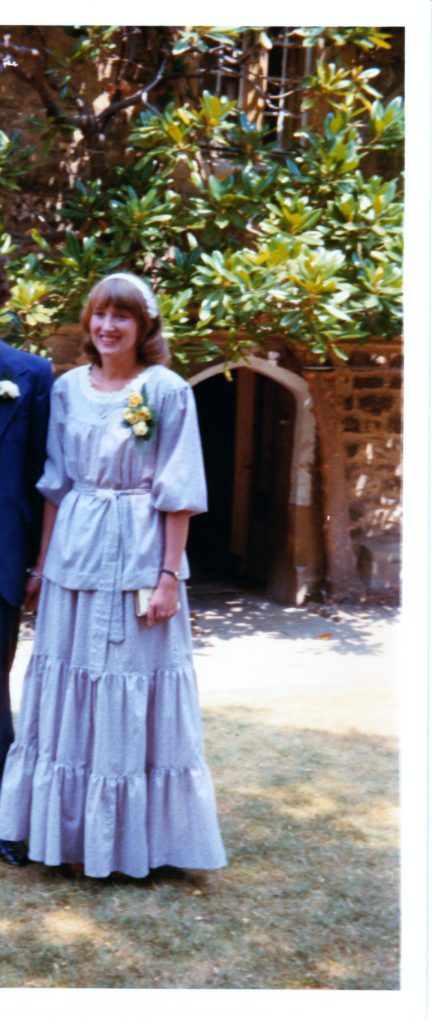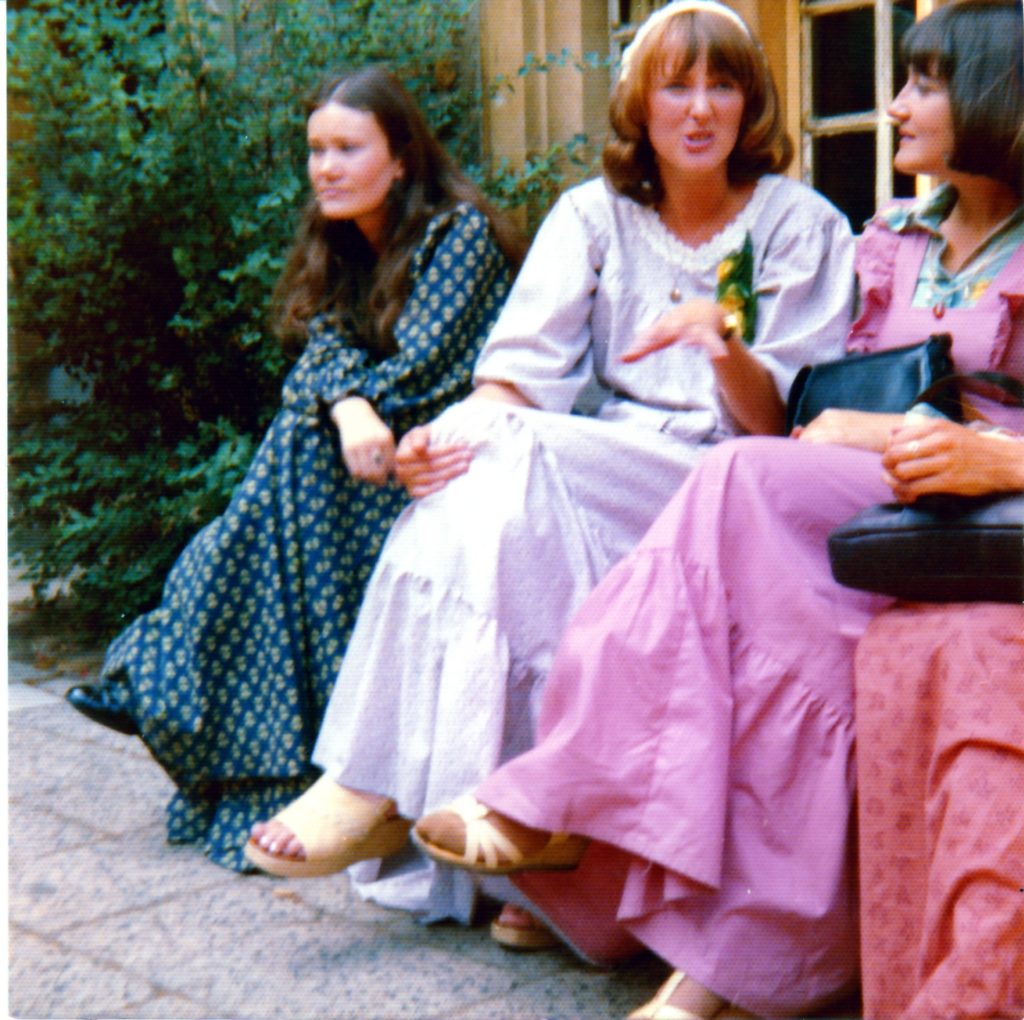My wedding dress was blue, not a pure blue, but a vaguely floral, sub Laura Ashley print with tones of blue, violet and cream. It was a cotton polyester mix, unlike the pure cotton garments favoured by ‘Laura’ herself. My mother and I bought the material for next to nothing in a shop in Wolverhampton, and then found a pattern in Beatties (the town’s only posh department store). The skirt was full and tiered, with a belt at the waist. The scooped neckline would be decorated with cream lace and I would wear a headband with the same lace and artificial cream rosebuds. I would carry my mother’s cream prayer book – a volume she kept for purely decorative and sentimental purposes.
It was not surprising that I had chosen a Laura Ashley sort of style. That year I was living in Bath, doing teacher training at the University, and Bath was the home of one of the first Laura Ashley shops outside London. The other girls on the course and I made a beeline for that shop on Saturdays, especially at sales time. I already, of course, had the second-hand skirt that I had bought in Oxford, and in Bath I added two knee length skirts to my wardrobe, one red and one navy, both decorated with tiny flowers. The skirts were pretty, but sensible; I would be able to wear them for teaching. Some of the other girls had several Victorian style long dresses, all frills and sprigs, that they wore to parties, and even for country walks; a touch of mud or dew around the frilled hem, was all part of the look, along with flowing long hair, preferably straight. There seemed to be something seductive about the contrast between the dresses evoking Victorian virginity, and the realities of smoking dope at parties and sleeping around. I had had my hair cut into a 70s style bob, smoking anything made me cough, and I was engaged, so I was only on the edges of the Laura Ashley dream of student life.
But perhaps, at least, I could be a romantic bride. My aunts set to work making my dress, and my mother baked and iced the wedding cake. We sent out ‘faire-parts’ to Richard’s French relatives, explaining that we were to be married dans l’intimité. My future mother-in-law assured us that this would take the sting out of the fact they were not invited. This was a necessary strategy given that the French family had split along party lines when Richard’s grandparents had divorced, and could not be gathered in the same room without a fracas. And there was some truth in the notion of intimacy as we were to be married in the tiny chapel of Richard’s Oxford college.
The marriage in the eyes of the law took place the day before, at Oxford Registry office, since in those days college chapels were not licensed. We wore ordinary clothes – in my case the red Laura Ashley skirt. My Dad was in his shorts – 1976 was a very hot summer. When the registrar pronounced us married we burst out laughing, and he gave us a look indicating that this response probably did not augur well for the future.
The next day I dressed in my finery, adding a corsage of real roses (yellow, not the cream I had asked for) to the dress. We sang slightly obscure hymns of my choice – ‘My song is love unknown’, and ‘For the beauty of the earth’. Richard and I turned to process out too early, before the Chaplain had finished the blessing. After the ceremony there were photographs, in the blazing sun. Then the lunch – fresh salmon, a luxury food in those days, and salads, and of course, the cake. And lots of very good wine from the college cellars.
In the afternoon we sat outside chatting and drinking wine and tea, leaning against the tombstones of the cemetery of St Peter-in-the East, which no longer functioned as a church, but as the college library. We visited the twelfth century crypt, whose cold, damp air contrasted with the heat of the day. My grandmother was photographed drinking tea, even though later she swore she had never had a cup. Although clearly she had had a bit to drink, she behaved with perfect decorum. My anxiety about my relatives ‘showing me up’ in front of my Oxford friends turned out to be unfounded. A photograph was taken of the two Mrs and Misses B. – Richard’s sister, aunt, mother and me. I was admitted to the family, and laden with hopes for its continuation. Confetti and rice were thrown, but perhaps the backdrop of the ancient tombs was another inauspicious sign: fertility withered by the proximity of death.
Later, I changed into my ‘going away’ dress, real Laura Ashley, bought in the sale again: a long navy sun dress with a frilled skirt and white sprigs, which I wore bare-armed, because of the heat. We drove off in our newly purchased, though not new Renault 4, to a hotel in a converted water mill in Abingdon. Our honeymoon was just one night in this hotel, which to us seemed extraordinarily luxurious. Money and time would not permit more as Richard was studying for law exams. We spent the whole night talking, mulling over the day, and thinking how lucky we were to have such families and friends. We did not consummate the union, which in any case was already consummated.
The next day we travelled on to Bath, where we would make a temporary home in two adjoining bed-sitting rooms. On arrival, Richard took so long parking the R4 that the next time we came to use the car, we found a notice on the windscreen ‘Reginald Molehusband Parking Award, Grade 3’. There was no fridge in our rooms, so I shopped and cooked every day on the Baby Belling. Food became my métier, and took up most of my time. Occasionally I would glance at the French text books I was to teach with in September, but all of that seemed unreal compared to my wifely duties in the kitchen, or more accurately ‘kitchen corner’. Perhaps also, I felt I had to excel there, because the bedroom scenes were an unmitigated disaster; the legalisation of our relationship seemed to have extinguished my desire. I had realised that something was wrong a few weeks before the wedding, but the machinery of arrangements for the ceremony was irresistible. I did not have the courage to intervene, even though I knew deep down that I was waiting for a deus ex machina to rescue me.
I changed my name, we opened a joint bank account. I felt as if I no longer existed. His parents came to visit and I prepared an elaborate picnic, which was consumed on the lawns in front of the Royal Crescent. I wore the red Laura Ashley skirt again, made meringues, and served them with whipped cream. My belle-mère approved of my culinary skills, having no ambitions in that line herself.
In the autumn, we moved to our first real home: a rented cottage in a Somerset village. It was pink, very picturesque and very damp, and our landlords were called the Powers. Everyone in the village had a name that signified their character or role: the Smarts, at the farm, constantly outwitted Major Power. The Foxes, up the road, were equally wily. Perhaps because our name signified nothing, we remained outsiders, despite our attendance at the Silver Jubilee preparation meetings. Then the shock of full-time employment added to our misery. On Fridays I taught nine 30 minute classes, including two sessions with 3F, who by the afternoon were less than fascinated by French verbs. Then I would cycle round to Finefare, the town’s only supermarket, and try to find something we could both afford and enjoy eating. Sausages or spaghetti were the usual solutions, and I often blessed Claudia for teaching me how to make a good Bolognese sauce. Then I would cycle another two miles home, usually in pouring rain, for the heat-wave had ended, and had been followed by a deluge.
Every purchase was the subject of major discussion, and I remember feeling we could not afford a packet of multi-coloured felt pens that I wanted badly. We were saving £50 a month for the deposit on a first house and on top of the rent of £75 a month little was left of our modest income. We did, in the end splash out on a black and white television, as winter evenings in a pink cottage in soggy Somerset did not offer much entertainment. There was a Bergman season, and I stayed up late, watching the films, and reflecting on the relationship dramas they depicted, and our own. Oxford friends came to visit, and although the weekends were jolly, they reminded us of everything we had lost. At Christmas I got a card from the boyfriend before Richard. I was tempted to write him a long letter, but I knew it would be wrong, so I resisted.
Richard and I became ever better friends and more infrequent lovers. The navy sun dress would have made a good maternity smock, but I did not want to be tied to a child. I wanted to do something creative. When I told his family this, in a hopeless attempt to justify our lack of fecundity, my belle-mère insisted it was already too late; Mozart was a great composer by 21.
We moved to Devon, and then to Kent, where I hoped the proximity of London would make us happier. At least we would be closer to our old friends. But things did not get better; Richard became depressed, and I felt guilty most of the time. His English grandmother died. They found her in an armchair, some time after lunch. We had visited her a few weeks earlier, in a ‘sheltered’ flat in south London that she never settled in. Everyone in the family except her knew that burglars were ransacking her old home, while the police did nothing. Perhaps she sensed something was wrong, and did not want to live to find out. With the money she left us we travelled round India by rail, visiting the cities of Rajasthan, Darjeeling, Delhi and Agra. We lingered in Agra for a few days, as if spellbound by the beauty of the Taj Mahal. We went there morning and evening, to see the effect of changing qualities of light on the marble. It was the year Diana and Charles got married, and we could not have imagined Diana sitting sad and alone in front of the Taj eleven years later.
When we got home, a few more months elapsed. There was another holiday, in France. In the Autumn it was clear that we had to face the terrible wrench of separating. I was working in Brighton, and on one wet October Sunday, Richard drove me across the Ashdown Forest to Kemp Town, where I had arranged to stay with my friend Celia. The rest of the inheritance was spent on our very amicable divorce.
I had imagined I could wear the wedding dress for parties, since it was blue and not very bridal, but in fact I never did. By the time I left for Brighton, all I had left was a piece of the cream lace trim.


Leave a Reply